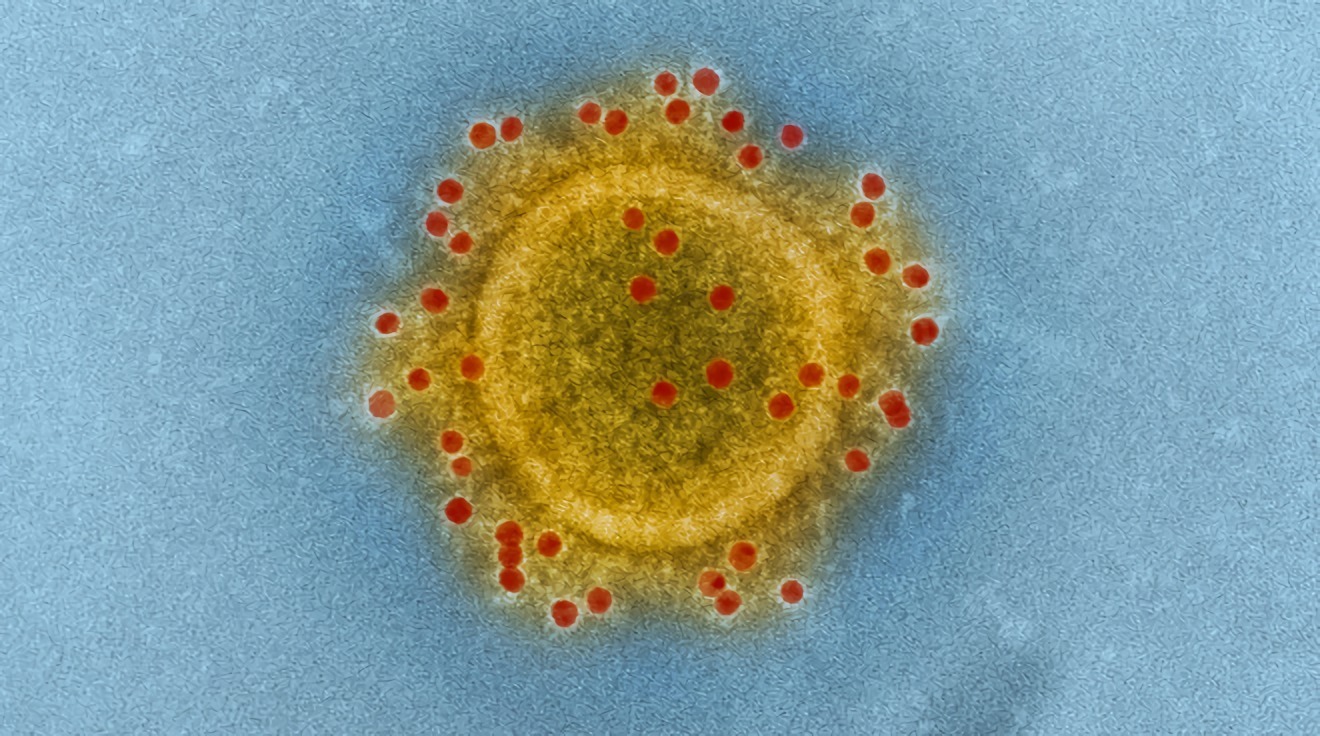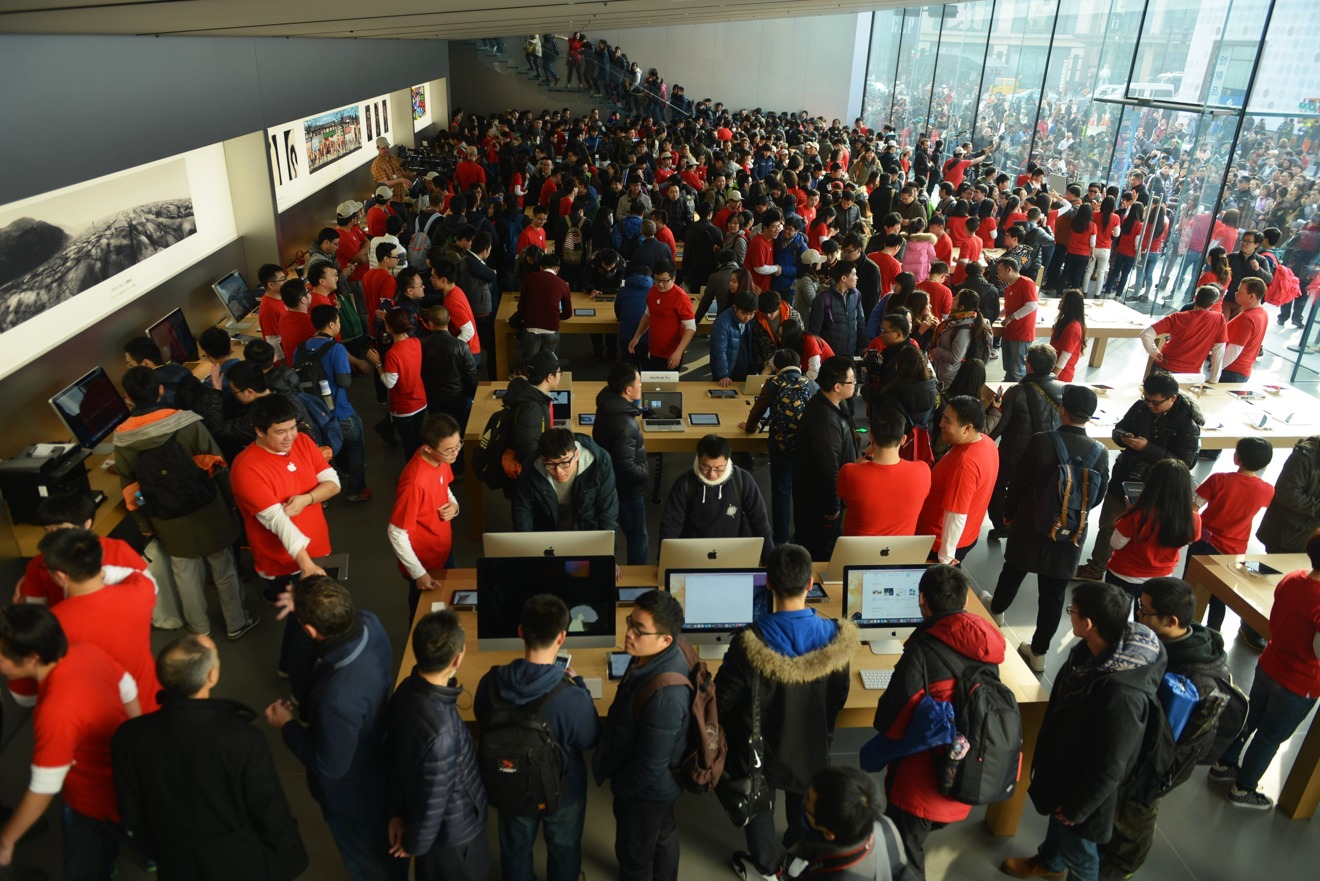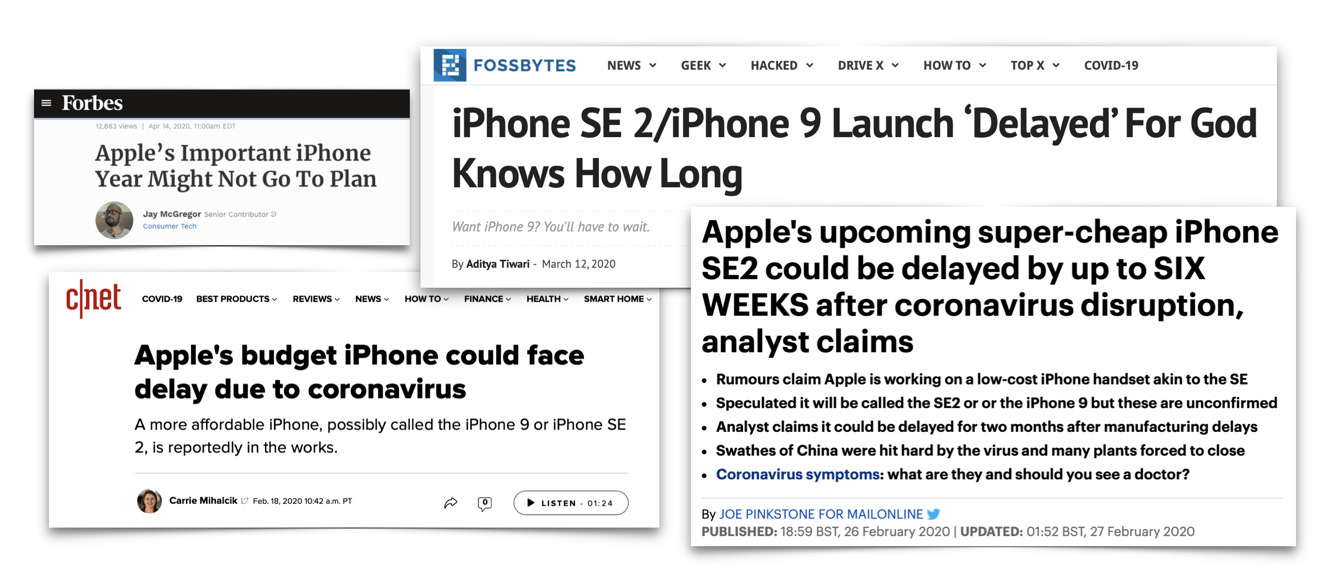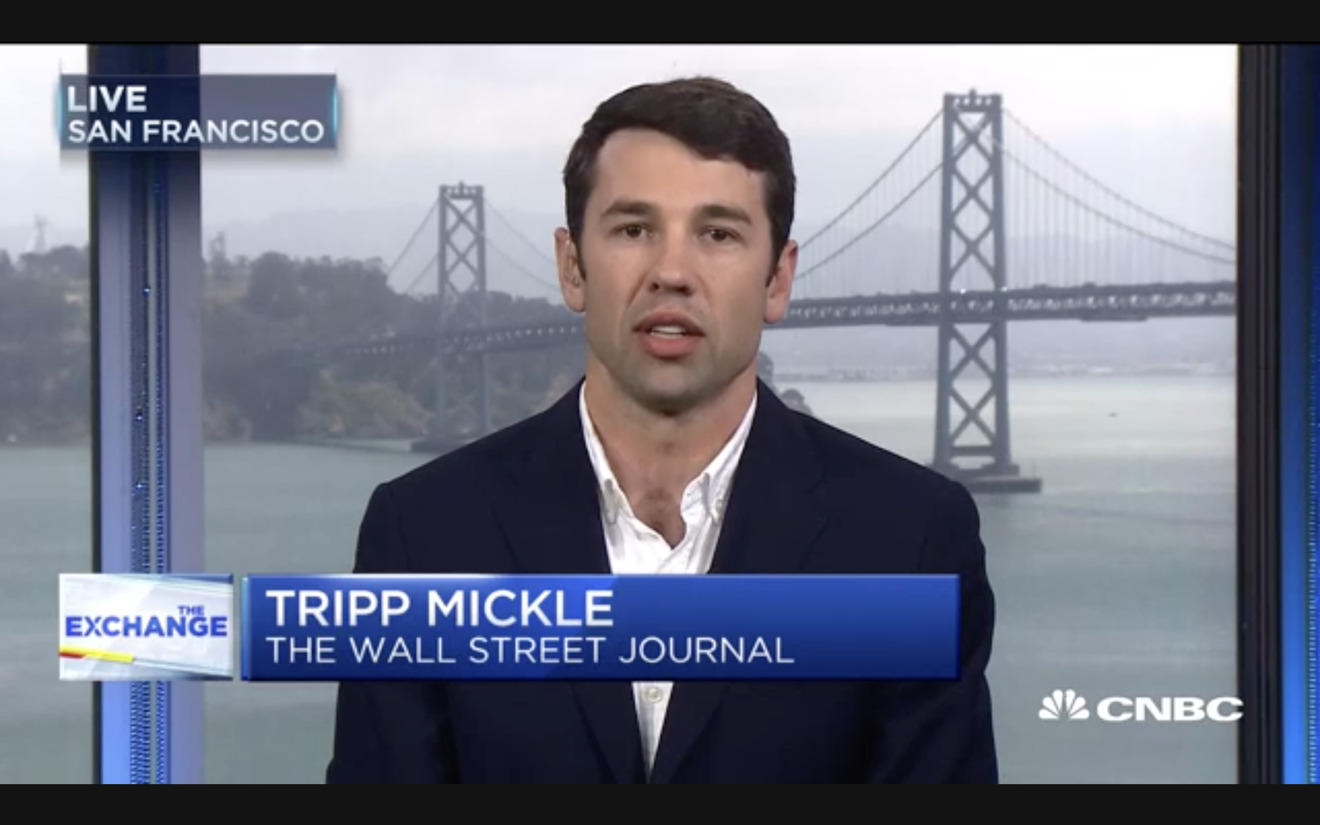Dire predictions for Apple's supply chain, retail demand were wrong
The same sources who were wildly wrong about Apple's inability to sell iPhone X were also way off base earlier this year in fantasizing dire impacts COVID-19 would have on Apple's global supply chain, its presence in China, and the effect that retail closures and an economic downturn would have on the demand for Apple's products.
Apple's recent introductions of its new 2020 iPad Pro and Magic Keyboard, a new line of MacBook Air models, iPhone SE, and the latest new 13 inch MacBook Pro all suggest that the company's ability to build and launch new products hasn't really been impacted by the ongoing pandemic at all.
The company's executives just noted in last week's conference call that all of the new products released in the second fiscal quarter "have all received outstanding customer response, even during these extreme circumstances."
That includes both the entry-level priced iPhone SE, Apple's cheapest new iPhone driven by its brand new A13 Bionic chip that's faster than much more expensive Androids, as well as the company's high-end new $799 or $999 4th generation iPad Pro with LiDAR and its custom-designed $350 keyboard option.
Retail set a new revenue record despite stores being closed
More surprising than the successful launches of its new products without the usual Apple Event to promote them was the continued growth the company experienced from its retail segment despite seeing all of its locations close in China, followed by widespread closures around the globe, which lasted for several weeks during the quarter.
Answering a question on store traffic at retail locations that have reopened, Cook stated that "store traffic [in China] is obviously up from where it was in February, but it is not back to where it was pre the lockdown. There has been, however, more move to online."
The shift in orders from retail stores to Apple's online retail operation has occurred as the company's stores globally shut down for three weeks during Fiscal Q2, following an earlier three-week shutdown that occurred in China. Cook said of the shift to online orders, "it's pretty phenomenal actually."
He added, "retail had a quarterly record for us during the quarter. And that's despite stores being closed [] So, there is definitely a move [online]. And whether that's a permanent shift, I would hesitate to go that far, because I think people like to be out and about. They just know that now is not the time to do that."
AppleInsider was unique in predicting back in February that much of Apple's retail activity would shift online as stores closed, stating that customers "aren't even very inconvenienced to make their immediate purchases over the next several days directly from Apple's online store."
That countered media narratives that assumed that nobody would be buying anything for the rest of this year, nor could they given that Apple's stores were closed and that most people were stuck at home. It's as if these bloggers all forgot that the internet existed.
Tech media wrong about supply chain, wrong about demand
Beyond imagining nothing but crisis for Apple's retail operations, there was also broad agreement among tech thinkers that Apple would be unable to manufacture anything in China at all, and that both its assembly partners and its supply chain would remain in a shambles for an extended period.
In February, Japan's Nikkei Business Daily was quick to cite "four people familiar with the matter" to claim that "public health experts" in China had determined a "high risk of coronavirus infection" at Foxconn facilities where Apple assembles its products, implying that Apple would have significant troubles getting production back on track.
That confidently issued Nikkei report was immediately denied by Chinese authorities, yet was treated by bloggers as if a controversial "he said, she said" sort of disagreement rather than just another a purely false, fear-inducing report from a news agency that has repeatedly issued incorrect reports about Apple that are always attributed to "people familiar with the matter" who end up never actually being familiar with the facts at all. And yet the Nikkei rarely even acknowledges when its reports are incorrect.
There were even widespread predictions that claimed Apple's anticipated iPhone SE would be significantly delayed by the pandemic and would not ship in Q2 as expected, and that even iPhone 12 might not arrive as usual this fall. Yet even from the start, few observable facts appeared to support these claims apart from more anonymous attributions to "people [suposedly] familiar with Apple's plans."
Writing for the Wall Street Journal in March, Tripp Mickle fantastically depicted Apple as being hopelessly stuck with much of its final assembly in China, and desperately needing to move its production somewhere else— a task which itself was portrayed as being nearly impossible.
Mickle skewered Cook as having made a terribly naive decision to move Apple's assembly to China in 1998, and depicted Apple's chief executive as uniquely positioned to be paying the price— as if virtually all major electronics manufacturing hadn't moved to Asia long before Cook had even joined Apple.
Every bit of Mickle's story was wrong. That didn't stop media hecklers from joining in the chorus that agreed with and praised his piece as 'deeply insightful' rather than simply being uninformed outrage-clickbait that presented select facts and ignored others that didn't back up its narrative.
Wrong about Apple's supply chain, wrong about demand
During Apple's fiscal Q2 earnings call, Cook appeared to indirectly call out the Wall Street Journal in stating that "our global supply chain is profoundly durable and resilient. We have shown the consistent ability to meet and manage temporary supply challenges like those caused by COVID-19."
Apple's supply chain and assembly partners proved to be just as resilient to crisis as AppleInsider had predicted, based on the previous performance of its exceptionally experienced Operations group. These are the same people that Mickle devalued as being less important than artistic product designers in his previous screed taking Cook to task for building Apple into a global operational powerhouse rather than remaining a quirky design office that shows the rest of the world how to craft their products.
While manufacturing in China has largely recovered, economic turmoil in the U.S. is just getting started. The same voices that once demanded that Apple bring its manufacturing "back to the U.S." are now witnessing how frail even America's far less sophisticated, lower value supply chain is for slaughtering cows and pigs.
The U.S. is struggling to open up the economy without a functional public health system, and without any real testing and tracking system in place. And despite efforts by Apple and Google to offer a secure, anonymous technical platform for widespread contact tracing, the U.S. Federal government simply isn't pursuing a comprehensive understanding of the pandemic through testing, under the hopes that the pandemic will go away on its own, even as deaths continue unabated.
Other advanced countries— notably South Korea and Germany— have already achieved a significant reopening of their retail and service-level industries, enabled by rapid efforts to test and trace infections. If Apple's manufacturing efforts were centered in the U.S., the company would be completely unable to compete with its rival peers including Samsung in Korea, and China's Huawei and Lenovo— both of whom have major operations situated in Wuhan, directly at the original epicenter of the pandemic. Yet those Chinese operations have already reopened, while America remains largely shutdown in a series of controversial fights over obtaining basic medical gear.
Mickle's piece from just a few months ago now sounds laughably uninformed, as if the Wall Street Journal staff that worked to put it together has zero real understanding of the global supply chain or the capacity of China to host and support its critical links of that technically complex infrastructure, complete ignorance of the scope of Apple's operations worldwide, and a painfully naive understanding of the fragility of American manufacturing and industry, operating under an ideology of a social net that barely exists for anyone apart from large corporations that demand public bailouts whenever they're not profitable.
If Apple had somehow moved its manufacturing to the U.S., it wouldn't be anywhere near its current position as the world's most valuable PC and phone maker, capable of shrugging off a global pandemic, working around the incompetence of various local governments, and so comfortably situated that it has the ability to not only continue development of its own work but can also contribute materially toward sourcing and building needed healthcare protective gear that the U.S. itself can't line up on its own.
 Daniel Eran Dilger
Daniel Eran Dilger














 Marko Zivkovic
Marko Zivkovic
 Amber Neely
Amber Neely
 Christine McKee
Christine McKee
 Malcolm Owen
Malcolm Owen
 Mike Wuerthele and Malcolm Owen
Mike Wuerthele and Malcolm Owen

 William Gallagher
William Gallagher








